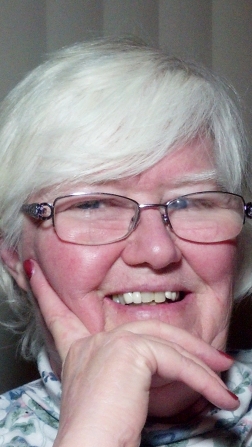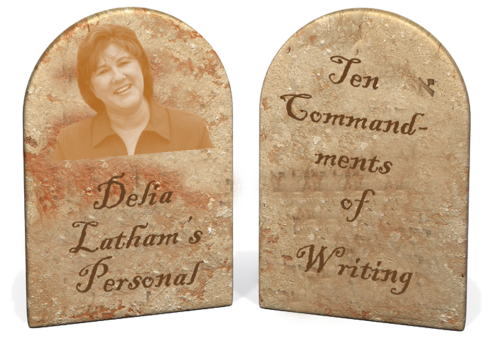This post is part of a mini-blog hop, in which a few writers have
committed to writing their own 10 Commandments of Writing, and sharing
them with each other and the public via posting to their blogs.
Following is my own, personal Ten Commandments of Writing. The other
authors are listed at the bottom of this post, with links to their
Commandments. We hope you’ll visit them all! 
1. Thou shalt not make writing thy god.
Whatever
has top priority in our lives becomes our god. In my life, only God is
God. I will control my career; it will not control me. Writing is high
on my priority list, but God is #1 on that same list. Family is #2. Then comes Career…#3.
II Peter 2:19b—People are slaves to whatever has mastered them.
2. Thou
shalt never forget Who gave thee the talent to write. Allow this Giver
of Gifts to dictate the words thou writest, and never forget that thou
art nothing more than a scribe for Christ.
God
is the author. I am only His transcriptionist. ALL the glory…ALL the
honor…ALL the recognition belong to Him. Should I ever be blessed with
success in the publishing industry, I will never fail to recognize the
true Author of the books whose covers bear my name.
1 Corinthians 10:31—Whether, then, you eat or drink or whatever you do, do all to the glory of God.
3. Thou shalt write something every day.
A journal entry, a blog, a short story or article. A chapter in your current WIP. Something. Every. Day.
That
said, life sometimes hands out a slice of “Surprise Pie” that puts a
kink in the works of my best-laid plans. Things will happen that I
cannot control. As often as possible, I will push aside, climb over or
dig under the road blocks and write anyway. But on days when it “just
ain’t happenin’,” I will not let that little kink clog my writing
arteries. I will make up for the day’s loss by writing more the next day or two.
Proverbs 24:16— For a just man falleth seven times, and riseth up again.
4. Thou shalt write a certain number of words per week on a current WIP.
Even when certain days do not include working on my WIP, by the end of the week, a specified word count goal should be met. Consistently. Every
week. Otherwise I’ll end up being buried someday with a stack of
journals no one wants to nose into tucked into the folds of my
satin-lined casket…and very few completed, published and well-received
novels.
Proverbs 16:3— Commit your work to the LORD, and your plans will be established.
5. Thou shalt not be kind to thy hero/heroine.
Effective
conflict does not happen with spoiled characters. As a writer, my job
is not to mollycoddle my hero and/or heroine. I must toss them into a
rink with the three H’s: Hardship, Heartbreak and Hopelessness.
Take away the things they love most. Put them in situations that seem
impossible to overcome…and then help them overcome them. (Or, in the
words of James Scott Bell, “Get your lead up a tree, throw things at him, get him down.”) Just
like in real life (and the Army, of course), sometimes a little tough
love is necessary to make a person “be all they can be.”
Ps. 66:10-12 (NIV)— 10 For you, God, tested us; you refined us like silver. 11 You brought us into prison and laid burdens on our backs. 12 You let people ride over our heads; we went through fire and water, but you brought us to a place of abundance.
6. Thou shalt be a ruthless killer of thy “darlings.”
My
words are not sacred. I will cut them. Edit them. Scratch them. Toss
them. Learn to tell the difference in gold and “fool’s gold.” I’ll keep
the best, toss the rest…then put the “best” to the test and start the
process all over again. Eventually, I will hold in my hand a shining
nugget of pure literary gold. A true darling.
Pro. 25:4—Take away the dross from the silver, and there shall come forth a vessel for the finer.
7. Thou
shalt accept constructive criticism with grace, and willingly learn
from the wisdom already gained by more experienced authors.
The Bible has a lot
to say about the ability to receive instruction…and the woes that
befall those who refuse to do so. Success comes from applying oneself to
learning from others who have already “been there.” No one is born
knowing everything he or she needs to know to be successful — in life or
in any chosen field.
It’s
crucial that I develop a thick skin and absorb instruction and
constructive criticism like the water of life…because, as far as my
career is concerned, it is. I will ask for it. Accept it. Take it with a smile. Apply it. And I will become a better writer.
Proverbs 23:12—Apply thine heart unto instruction, and thine ears to the words of knowledge.
8. Thou
shalt not forget that someone helped you, nor fail to return the
blessing by helping other writers traverse the path you’ve already
walked.
The
circle of writing life. One learns, and then passes on that acquired
knowledge to less experienced writers…even as one continues to learn
more. I will never stop learning and never stop passing on the blessing
of knowledge. The circle never ends.
Genesis 12:2— And I will make you a great nation, and I will bless you, and make your name great; and so you shall be a blessing.
9. Thou shalt not covet thy fellow author’s gift, nor compare thy gift with another’s.
Learning
writing techniques and mechanics from more experienced authors is a
good thing. Trying to duplicate their writing styles is not a good thing. I will learn from others, but I will apply my own skills and talents and experiences and uniqueness to develop a voice and writing style of my own. I will write like me. Mimicry and uncomplimentary comparison of myself to another writer is not beneficial.
2 Corinthians 10:12—…but they measuring themselves by themselves, and comparing themselves among themselves, are not wise.
10. Thou shalt write with all thine heart, and with all thy soul, and will all thy strength, and with all thy might.
I will write with passion and joy. Nothing offered half-heartedly is ever good enough.
I
will love what I’m doing for as long as I do it. If I stop loving it, I
will stop doing it. I cannot write with passion if I don’t love to
write. And if I can’t write with passion, I’m wasting my time and my
readers’ time. I will love it or leave it.
However,
I must remember that “the gift and calling of God are without
repentance.” God has called me to write, and He’s not going to change
His mind. But He wants me to be joyful in my journey. Based on Ps. 16:11
(see below), it would stand to reason that, if I lose joy in doing what
God called me to do, then I must have somehow taken myself out of the
presence of the Lord. If that happens, I must find Him again… absorb
myself in His presence…and find my way back to a joyful writing journey.
Col. 3:23— Whatever you do, work at it with all your heart, as working for the Lord, not for human masters.
Ps. 16:11— Thou wilt shew me the path of life: in thy presence is fulness of joy; at thy right hand there are pleasures for evermore.
Well, those are MY commandments. The links below
contain commandments written by author friends. Please…won’t you visit
them, as well?

















